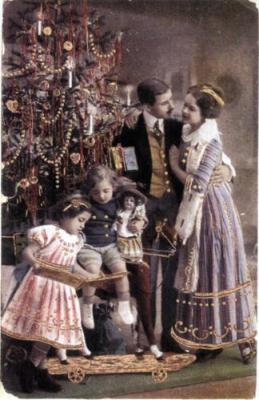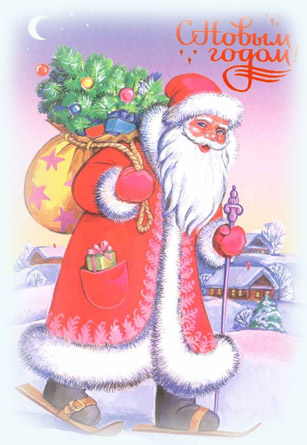It has been a loooonnggg time since I asked you all a question for my book!
I have a question about a scene that I am fairly certain will develop at some point within my book and as I have been thinking about it for a few weeks now, I figured I should ask now before I forget about it.
For those of you who don’t know (as it has been a long time), I had started writing a book about a year ago at the request of my daughter. I haven’t done very much with it in months, yet I hope to get back to it soon. Dmitri is the main male character and I believe from everything I have learned from this forum, he would have been born in Russia and left Russia as a child. So he knows Russian, has Russian memories, a nice Russian accent when speaking Russian and not the strong Russian accent when speaking English. And… thanks to all those who helped me to confirm that he CAN indeed have his gray eyes as my daughter requested!
Back to my question…
The holiday season in Russia. Particularly the Christmas, Hanukah, New Year season.
Here in the States it is very commercialized and I personally abhor the entire thing. What once started out as the shopping or get in the mood spirit traditionally started AFTER our Thanksgiving Holiday (the fourth Thursday in November). This year, BEFORE Halloween there were Christmas displays up in the stores. There are already the Salvation Army bell ringers out asking for donations.
So, besides the traditional movies which are watched and we have discussed… what is this season like in Russia these days?
How commercial is it now?
Do people in general celebrate the “season” even if it is not their faith?
When does the "season" start?
Are buildings and stores all decorated with lights and such?
If I were to include a section about Dmitri remembering this as a child, what would stand out? What would be a “must have?”
I recall hearing something last year, that people are given a number of days off from work and things pretty much shut down. This is an “odd” concept to me. How can businesses be “forced” to close for more than one day? Who pays the employees for all this time off? What if you want to buy something or need a service?
I remember when I was a kid we had “Blue Laws” and many stores were closed on Sunday or had limited hours and limits on when you could buy alcoholic beverages. And they still limit when you can but a car of all things! Otherwise, most of the Blue Laws are gone.
What else should I know that I have not asked?



 LinkBack URL
LinkBack URL About LinkBacks
About LinkBacks






 Reply With Quote
Reply With Quote This way we have more holidays than the rest of the world.
This way we have more holidays than the rest of the world.

 and was officially approved only a couple years ago.
and was officially approved only a couple years ago.
 Though I don't see that as a bad thing neccessarily. It creates a special atmosphere and mood... This year I saw workers constructing a special long counter all devoted to New Year merchandise in the shopping center where I used to work as early as the beginning of November.
Though I don't see that as a bad thing neccessarily. It creates a special atmosphere and mood... This year I saw workers constructing a special long counter all devoted to New Year merchandise in the shopping center where I used to work as early as the beginning of November.






 *шепотом*мне наш больше нравится*
*шепотом*мне наш больше нравится*

 ). It is very popular with young girls to practice fortune-telling at this time, to learn who is going to be their husband. There are all sorts of ways to tell fortunes, which are described in some Russian classics -- e.g. Natasha and Sonya in "War and Peace" try to see their future husbands using a trick with two mirrors and candles. Other ways are trying to the future in the shapes that molten wax assumes in water, or filling a deep plate with different objects that symbolise wealth, marriage, etc, and then drawing them without looking, etc. Tatyana in "Eugene Onegin":
). It is very popular with young girls to practice fortune-telling at this time, to learn who is going to be their husband. There are all sorts of ways to tell fortunes, which are described in some Russian classics -- e.g. Natasha and Sonya in "War and Peace" try to see their future husbands using a trick with two mirrors and candles. Other ways are trying to the future in the shapes that molten wax assumes in water, or filling a deep plate with different objects that symbolise wealth, marriage, etc, and then drawing them without looking, etc. Tatyana in "Eugene Onegin":












 Everyone was a hare or a snowflake (option: a squirell) at least once in his/her life. It's a given. ))))
Everyone was a hare or a snowflake (option: a squirell) at least once in his/her life. It's a given. )))) 

 Dmitry whould "remember" something like that. I chose a few to start with (there are loads of them on Youtube, but they are very much alike).
Dmitry whould "remember" something like that. I chose a few to start with (there are loads of them on Youtube, but they are very much alike). The little guy to the left is hilarious. And I like the way grownups giggle at the background.
The little guy to the left is hilarious. And I like the way grownups giggle at the background.

